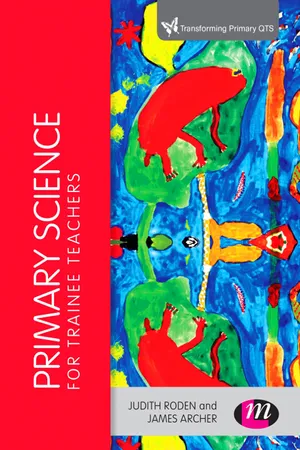
- 264 pages
- English
- ePUB (mobile friendly)
- Available on iOS & Android
Primary Science for Trainee Teachers
About this book
With chapter sequencing following the new Curriculum, this book supports trainee Primary school teachers to make use of the opportunities presented in the new National Curriculum for effective and engaging Science teaching.
Covering all of the areas of the new National Curriculum for primary science and offering insight into effective teaching, it helps you connect what you need to teach to how it can be taught. This comprehensive guide to teaching Primary Science will help you secure your subject knowledge, understand how children learn about science and know how to plan and teach effective and inspiring science lessons. Exploring opportunities in the new curriculum for creative and imaginative teaching, it shows you how to capitalize on opportunities to teach Science in a way that sparks children?s interest.
Includes the full National Curriculum Programme of Study for Science, key stages 1 and 2 as a useful reference for trainee teachers.
Other books in this series include: Primary Mathematics for Trainee Teachers and Primary English for Trainee Teachers
Tools to learn more effectively

Saving Books

Keyword Search

Annotating Text

Listen to it instead
Information
1 Working Scientifically
Learning Outcomes
- an awareness of the importance of working scientifically;
- an understanding of the key scientific processes that underpin working scientifically;
- a knowledge of the progression in the process skills that underpin working scientifically;
- an understanding of effective pedagogic strategies for the teaching of working scientifically.
Teachers' Standards
- 2. Promote good progress and outcomes by pupils
- be aware of pupils’ capabilities and plan teaching to build on these
- demonstrate knowledge and understanding of how pupils learn and how this impacts on teaching.
- 3. Demonstrate good science subject and curriculum knowledge
- have a secure knowledge of science and foster and maintain pupils’ interest in science
- demonstrate a critical understanding of the developments in the subject and curriculum area.
Introduction
What is Science?
Key Scientific Concepts
- The process skills in science
- Working scientifically
- Progression in working scientifically
- Types of investigations
Research Focus
- In the best schools visited, teachers ensured that pupils understood the ‘big ideas’ of science. They made sure that pupils mastered the investigative and practical skills that underpin the development of scientific knowledge and could discover for themselves the relevance and usefulness of those ideas.
- Science achievement in the schools visited was highest when individual pupils were fully involved in planning, carrying out and evaluating investigations that they had, in some part, suggested themselves.
- provide sufficient weekly curriculum time so that individual pupils develop good scientific enquiry skills as well as the knowledge they need.
- in primary schools, monitor pupils’ progress in science regularly to ensure they are supported effectively to reach their potential.
- use assessment effectively to plan lessons that build on individual pupils’ prior knowledge and provide feedback that genuinely helps pupils to improve their work in science.
Reflection
The Process Skills in Science
Observation and Questioning
Curriculum Links
Case study: Candles
Table of contents
- Cover
- Half Title
- Title Page
- Copyright Page
- Contents
- Acknowledgements
- About the Authors and Series Editor
- Introduction
- 1 Working Scientifically
- 2 Plants
- 3 Animals, Including Humans: The Parts of the Body, the Senses, Teeth, Nutrition and the Digestive System
- 4 Animals Including Humans: Growth, Reproduction and the Circulatory System
- 5 Variety of Life: The Characteristics of Living Things, Variation and Classification
- 6 Habitats
- 7 Everyday Materials: Their Uses, Properties and Changes of Materials
- 8 Forces
- 9 Earth, Space and Rocks
- 10 Light, Sound and Electricity
- Appendix 1: Model Answers to Self-assessment Questions
- References
- Appendix 2: Science Programmes of Study: Key Stages 1 and 2: National Curriculum in England: September 2013
- Index
Frequently asked questions
- Essential is ideal for learners and professionals who enjoy exploring a wide range of subjects. Access the Essential Library with 800,000+ trusted titles and best-sellers across business, personal growth, and the humanities. Includes unlimited reading time and Standard Read Aloud voice.
- Complete: Perfect for advanced learners and researchers needing full, unrestricted access. Unlock 1.4M+ books across hundreds of subjects, including academic and specialized titles. The Complete Plan also includes advanced features like Premium Read Aloud and Research Assistant.
Please note we cannot support devices running on iOS 13 and Android 7 or earlier. Learn more about using the app